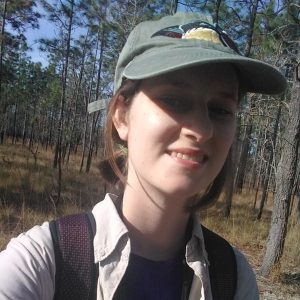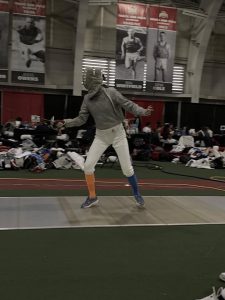
Sylvia Van Boskirk’s heart has been set on becoming an ecologist and conservationist since she applied to the University of Florida. Through opportunities at UF, Van Boskirk has thrived both academically and socially, and is even more excited for her future in wildlife ecology and conservation.
Van Boskirk is the first UF student to earn her bachelor’s degree utilizing the wildlife ecology and conservation combination degree program. Through this program, Van Boskirk took both undergraduate and graduate courses as an undergraduate student. The graduate credits she received helped her earn a Bachelor of Science degree, and in just one more year she will graduate with a master’s degree in the same major.
“I’ve always been really interested in teaching in academia and doing research,” Van Boskirk said. “The combined master’s was a great way to get some graduate coursework out of the way early, and it’s really helped prepare me for grad school next semester.”
During her freshman year, Van Boskirk took an avian field research class, and spent spring break with her classmates at the Ordway-Swisher Biological Station in Melrose, Florida. While there, the students learned about different techniques for sensing, catching and banding birds, and also worked on a mini-research project.
“Taking that class my freshman year really kind of solidified I’m in the right place. These are the right people for me,” Van Boskirk said.
As a sophomore, Van Boskirk delved deeper into research, working with Katie Sieving in her research lab. Sieving’s research in avian communication and avian vocalization aligned with Van Boskirk’s interests. At first, Van Boskirk worked with other graduate students, but she is now working on her own project that will become her master’s thesis.
For her thesis, Van Boskirk’s research focuses on the complex communication system of the Tufted Titmouse. This bird is important for disseminating information, such as threats, to other birds and species within the forest ecosystem. Van Boskirk is trying to understand how the Tufted Titmouse changes its behavior and communication based on the audience around it. That audience often includes humans, and the behavior changes by the bird can impact the overall forest health.
“As humans, we have a responsibility to be aware of our impacts on other animals and these birds and especially songbirds, which you know, have some of the most beautiful songs in the animal kingdom,” Van Boskirk said. “The world would be a better place if we understood more of our impact on those birds.”
In the future, Van Boskirk hopes to work in education, at either the high school or college level or through the National Park Service.

“I really enjoy doing research and answering these questions for myself and for the scientific community,” Van Boskirk said. “I really want to have a part in teaching the next generation about the things I’m passionate about.”
Beyond research, Van Boskirk also has an interest in music and dance. She has been involved in the UF jazz band where she played the tenor saxophone and has also taken classes within the music department. Beyond music, Van Boskirk also traveled to various U.S. cities as part of the fencing team she joined.
“The atmosphere [at UF] is so welcoming and encouraging. I feel like that created an environment where I was able to feel comfortable going out of my comfort zone which was nice,” Van Boskirk said. “At this point, I’m just really excited for what’s next and I feel really well prepared.”
 1
1
